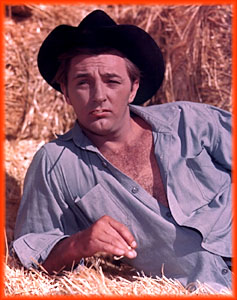The Lusty Men (1952) teamed with the best director of the 1950s, Nicholas Ray Mitchum's weary rodeo rider is a role tailor-made for him: the perpetual loner and wanderer. Nothing seemed to sum up the loneliness of the character better than the scene in which he walks across a wind swept field toward his childhood home, a rootless man belonging to no one but himself. It's also the best portrayal of Mitchum the womanizer, confident of his appeal to all women, yet content to let nothing happen--whether out of loyalty, pride, or indifference.
The Lusty Men Nicholas Ray (U.S., 1952)
Lusty Men is less a "man's film" than a melancholy and moving critique of masculine values. This complex triangle involving a former rodeo champion (Mitchum), his cowboy protege (Arthur Kennedy), and the cowboy's wife (Susan Hayward). The two American prototypes-the itinerant outsider and the homesteader-against one another, with a third, the fifties housewife, caught in between. We find the loneliness inherent in each position: in Mitchum's machismo, in Kennedy's go-for broke ambition, and in Hayward's conflicting desires for passion and peace, both thwarted by the urgencies of a man's world.
Mitchum: "That's a wife's profession...forgiving her husband." Hayward: "Men! I'd like to fry 'em all in deep fat.") The film is set against an authentic rodeo background that is vividly evoked by Lee Garmes's cinematography. Ray said, "I felt that it had a kind of poetry and a reality of human relations that was quite accurate."
Written by Horace McCoy, David Dortort, from a story by Claude Stanush. Photographed by Lee Garmes. With Robert Mitchum, Arthur Kennedy, Susan Hayward, Arthur Hunnicutt. (113 mins, B&W, 35mm, From Kino)
mouse-over
